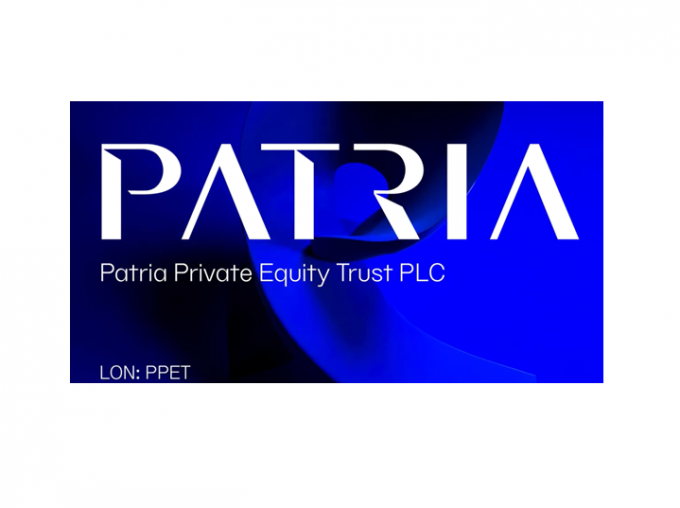Patria Private Equity Trust (PPET) has published its half-yearly report for the six months to 31 March 2025, delivering a NAV total return of 2.6% and a share price total return of 5.9%. Despite a more subdued private equity market, PPET’s portfolio continued to perform well operationally, with strong earnings growth among underlying companies and further progress in its maturing direct investment programme.
NAV per share edged up to 791.8p, while the share price discount narrowed modestly to 29.5%. Over the last decade, PPET has delivered an annualised NAV total return of 14.1%. Notably, the trust’s share price total return has outpaced the All-Share over 1, 3, 5, 10 years and since inception in 2001.
Strong operational delivery from the portfolio
The trust continues to benefit from its diversified exposure to more than 600 private companies, with a heavy bias towards the resilient, cash-generative European mid-market. The top 100 companies – accounting for over 60% of NAV – posted average revenue and EBITDA growth of 15.0% and 21.0%, respectively, over the last 12 months. Valuations remain stable, with an average multiple of 13.8x EBITDA. The manager notes that realisations achieved during the period were struck at an average 18.9% uplift to carrying value and generated a return of 2.6x cost.
Slower exit activity, but dry powder in place
While the trust saw a stronger start to the financial year, the latter part was weighed down by rising macro uncertainty and the announcement of new US tariffs, which prompted delays in several planned exit processes. Nonetheless, PPET generated £108.0m of realisations during the period, including notable exits from Mademoiselle Desserts and GRITEC. Cashflows were broadly neutral, with drawdowns matching distributions.
The trust has access to £382.5m in short-term liquidity, including cash, undrawn credit lines and deferred consideration from last year’s £180m secondary sale. Its over-commitment ratio sits at a conservative 26.6%, below its long-term target range, reflecting recent de-risking and increased credit facility headroom.
Direct investments now over a quarter of NAV
PPET continues to increase its exposure to direct investments, which now account for 27.1% of NAV (33 companies). During the period, it made two new direct investments – Agora Makers and Soleo Health – and a follow-on investment in Boost.ai.
Agora Makers, a French public lighting specialist, was acquired through a continuation vehicle in partnership with Hivest Capital and Patria. Soleo Health provides complex infusion and pharmacy services in the US. Both deals reflect the trust’s focus on scalable businesses with strong market positions and long-term secular growth drivers.
Steady investment pace and focus on lower mid-market
Four new primary fund commitments totalling £80.9m were made during the period, including allocations to Impilo Fund II and Nordic Capital Evolution Fund II – both focused on the healthcare and lower mid-market space. A further US$50m was committed to Patria SOF V, a secondaries vehicle.
The manager highlights its continued preference for the lower end of the mid-market (enterprise values of €100m–€500m), which PPET’s manager says offers a more attractive risk/reward profile and less reliance on leverage or IPOs for exit.
Dividend growth continues
The board reaffirmed its commitment to maintaining the real-terms value of the dividend, increasing the forecast payout for the 2025 financial year to 17.6p (2024: 16.8p), marking PPET’s eleventh consecutive year of dividend increases. The trust has been added to the AIC’s list of “Next Generation Dividend Heroes.”
Outlook
While acknowledging a weaker-than-expected private equity environment so far in 2025, PPET’s chair remains cautiously optimistic. The trust holds a portfolio with a high proportion of mature companies, many of which are ready for exit as and when market conditions improve.
With £1.2trn of dry powder still waiting to be deployed globally, and interest rate expectations beginning to ease, PPET could be well placed to benefit when deal flow rebounds. The trust’s robust balance sheet and high-conviction portfolio give it the flexibility to take advantage of market dislocations and continue compounding returns over the long term.
[QD comment, Matthew Read: PPET continues to execute well in what remains a sluggish environment for private equity exits. While NAV growth over the six-month period was modest, the underlying portfolio performance tells a more positive story, with strong revenue and earnings growth across the top holdings and realisations continuing to come through at uplifts to carrying value.
The trust’s balance sheet looks well set, especially following the upsizing of the credit facility and last year’s timely secondary sale, giving it ample dry powder to deploy should opportunities arise. It’s also encouraging to see direct investments now forming over a quarter of the portfolio – a segment that should bring greater control, lower fees and better alignment over time.
Despite the muted deal environment, PPET looks well-positioned to benefit when private equity markets reawaken. With around 60% of its holdings maturing past the four-year mark, a pickup in activity could drive meaningful NAV progress in future periods. In the meantime, the trust’s ongoing dividend growth and narrowing discount should offer some support to shareholders.]
